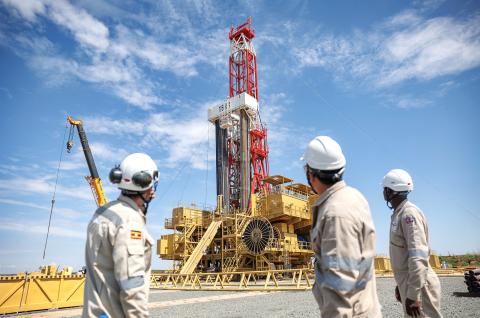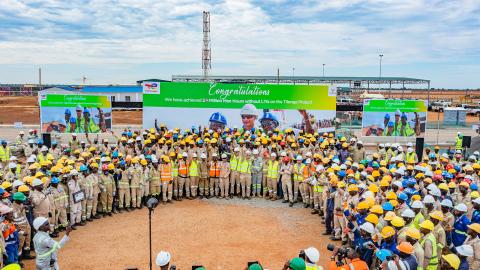TotalEnergies in Uganda
On 28th May 2021, Total, the parent company of TotalEnergies EP Uganda changed its name to TotalEnergies as part of its strategy and journey to becoming a broad energy company that is committed to producing and providing more affordable, reliable, and clean customer solutions.
TotalEnergies has been present in Uganda since 1955 through its Marketing and Services affiliate-TotalEnergies Marketing Uganda Ltd and is currently the market leader with over 200 service stations across the country and offers a full range of petroleum products and services. In 2010, the Company set up its Exploration & Production affiliate, TotalEnergies EP Uganda.
TotalEnergies MS Uganda: 60 years and growing

TotalEnergies MS was incorporated in 1955 and has been present in Uganda for over 60 years. Over these years, we have grown to become the leading service provider in the country. We have the 2nd largest distribution network of over 200 active service stations countrywide offering a full range of petroleum products and services.
In January 2015, TotalEnergies Uganda kicked off celebrations to mark 60 years of doing business in Uganda. This coincided with the unveiling of the new image of its service stations with a more contemporary and environmentally friendly look. In 2016, TotalEnergies Uganda introduced Excellium, a new line of specific fuels that clean engines, provide lasting protection to ensure they perform better, use less fuel and produce fewer polluting emissions. This is in line with the group’s vision of “Committed to better energy” which means safer, cleaner, more efficient, more innovative and more accessible energy.
Our Vision:
To be the preferred choice for high quality petroleum products and services anchored on a dynamic and diverse human capital; delivering sustainable value and relationships.
Our Mission:
To be the preferred oil company for customers and a reference in corporate citizenship, while delivering sustainable shareholder value by providing high quality petroleum products and services, anchored on a dynamic and diverse human capital
TotalEnergies EP Uganda

TotalEnergies EP Uganda is working with CNOOC Uganda and Uganda National Oil Company (UNOC) through a Joint Venture Partnership in which the Companies hold 56.67%, 28.33% and 15% respectively in the upstream development of Uganda’s Lake Albert oil resources. The upstream project comprises the Tilenga project operated by TotalEnergies EP Uganda, and the Kingfisher project operated by CNOOC Uganda.
The Tilenga project is located in Buliisa and Nwoya districts and will produce 190,000 bopd (at peak). The project covers 6 fields with over 400 wells to be drilled on 31 well pads in line with the company’s commitment to limit Social, environment and biodiversity impacts.
Other main project installations include a Central Processing Facility, flow lines, lake water abstraction facility, a feeder line and construction camps and support bases. Some of the Lake Albert resources will be transported through a 1,443km East African Crude Oil Pipeline (EACOP) from Kabaale, Hoima in Uganda to the Chongoleani Peninsula near Tanga port in Tanzania for export to the international market.
The pipeline has the capacity of transporting 216,000bopd and is operated by EACOP Ltd whose shareholders are TotalEnergies East Africa Midstream (62%), UNOC (15%), CNOOC (8%) and the Tanzania Petroleum Development Corporation (TPDC) (15%). TotalEnergies EP Uganda is committed to undertaking the Tilenga project in accordance with national regulations, the UN Guiding Principles on Business and Human Rights and the IFC Performance Standards.

TotalEnergies puts Corporate Social Responsibility (CSR) at the heart of its activities and conducts its operations according to the following principles of:
- protecting the safety and security of people and its facilities;
- limiting its environmental footprint;
- ensuring that its Code of Conduct is applied in its sphere of operations;
- incorporating the challenges of sustainable development in the exercise of its activities;
- increasing its local operations by placing dialogue with its stakeholders at the heart of its policy and contributing to the economic and social development of the regions where the Group has operations with the objective of creating shared value;
- promoting equal opportunities and fostering diversity and cultural mix among its personnel.


